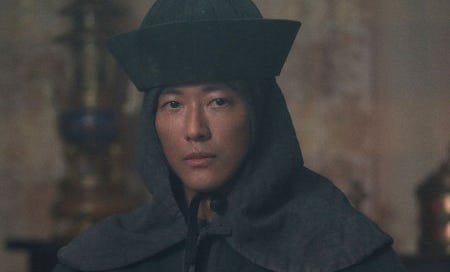My Dearest (2023) Episodes 5 and 6
The thing that strikes one immediately is how grossly incompetent the existing administration is. All that book learning seems to have bred nothing but arrogance and a ridiculous sense of hubris. The “barbarians” from the north might be uncultured and violent but they have a resolute army. And are brimming with survival smarts. The cult around the Joseon king feels fatuous in the face of such a powerful threat. I did a bit of light bedtime reading the other night night and concluded that the administration could easily be accused of being its own worst enemy. It’s the consequence of a faction of politicians cocooned in their ivory tower unseating a more politically savvy ruler and replacing him with someone who just doesn’t have the vision or the chops to deal with actual geopolitical realities. It’s as much their fault as it is his. It’s a bitter clinging administration gripped in an ideology reflecting their cultural mores. It constantly beggars belief how idiotically unprepared the government is in this entire situation. Militarily and logistically. This king whines about humiliation while his people are starving and running for their lives even in safe havens. I wonder all the time about the claim that the yangban are schooled in the sages. Where has all the sagacity gone? I am equally curious about the noticeable absence of all the various volumes on the art of war written by key figures in Chinese and Korean history. I’m no expert on battlefield tactics or military history but Joseon surely could have done much more for the populace than the one-note defensive posture of protecting the king.
I’ve heard it said that intellectuals are often educated to the point of stupidity. Yeon-jun epitomizes this so-called paradox. The rallying cry about protecting the king becomes a running gag when Yeon-jun can barely protect himself. It’s little more than a hollow platitude. Without Jeong-hyun, Yeon-jun and many young man of his ilk would never see the fortress where the king had taken up residence. Indeed many didn’t. I call it the cult of the king. It suits the king to embrace this entire way of thinking and this affects his entire strategy in dealing with the hostile hoards knocking on his doorstep. This perception of self-importance in a time of national crisis sees him burst into sobs about becoming a tributary to the Manchurians. This king that replaced a greater mind than his is such a feeble helpless creature to the point of embarrassment. He is the worst kind of leader with the worst kind of government in that kind of geopolitical context. Bound by long-standing tradition, he can’t do basic triangulation. He can’t even protect his own son from becoming a hostage. He’s a coward and a flagship for a foreign policy agenda that is being rendered irrelevant at this point by someone with far more determination to hold his ground than he is. It’s also unforgiveable that this policy of protecting the king from humiliation sees women, children and the elderly sacrificed senselessly.
In the middle of this crisis are Jeong-hyun and Gil-chae. All their resourcefulness and quick-wittedness serve them and those around them well. They are no worse than anyone in fact but are more honest about their intentions. When a person’s neck is on the chopping block, what wouldn’t he/she do to save his/her own skin? Yet it’s not all about them alone.
The king is meant to be the symbol of the country which is why all efforts are directed towards him. Even the Khan knows that he has to get him to bow the knee. But kings are also just flesh and blood. They have their weaknesses. One of the themes here is pride. The pride of both sovereigns are at stake. They each have something to prove. One has to prove not only that he is racially superior but also that he was right about usurping the throne from someone with radical ideas. The other is adamant to prove that he has the “mandate of heaven”. Compromise wounds both their pride. Humiliation is both a weapon and a resolution when honour and shame is the guiding light of a society.
Jeong-hyun and Gil-chae’s pride go along way to explaining their push and pull. It’s clear to everyone including blind Freddy that they both have feelings for each other. But neither will make the first move. They have met their match in each other. Jeong-hyun is loath to commit himself to a woman whose feelings are in doubt. It doesn’t help that though she occasionally looks like she’s keen, she behaves in contradictory ways and protests far too much about his non-existent. It’s as if she’s looking for a reason to reject him always just as she constantly seeks affirmation that Yeon-jun is in love with her. It also doesn’t help that Jeong-hyun teases her relentlessly about her so-called feelings for Yeon-jun. On top of all that his unconventional views on marriage don’t give her a whole lot of confidence that she’ll get a lifetime commitment from him. So yes, we have two proud people who refuse to give in and therefore they are at an impasse.
Whatever Jeong-hyun does in the war — going undercover and infiltrating the Manchurian camp, protecting Yeon-jun etc. it does seem like he is doing all of it for Gil-chae. I wonder if his MO with the teasing is his way of testing her. Perhaps, he thinks, one of these days she might really let slip how she feels. For a man who is supremely confident about many things, he is very insecure about how the woman he has fallen for thinks about him.
It’s a clash between tradition and new thinking both at a macro and micro level. In such times mavericks and out-of-the-box thinkers are proving that they may just have a point about how those in authority haven’t got a clue.



